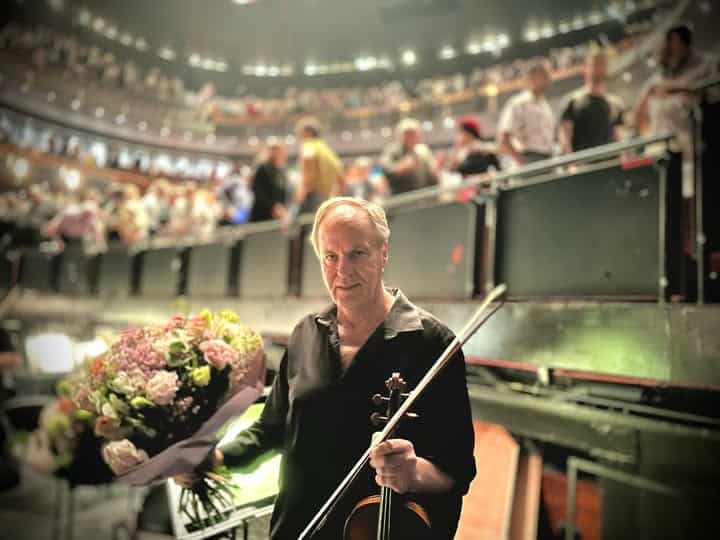Guess what? Mahler’s back
NewsAlastair Macaulay reviews last night’s Philharmonia concert at the Royal Festival Hall:
Philharmonia Orchestra 2021.xi.12 Beethoven; Mahler – The Song of the Earth
by Alastair Macaulay
On Thursday, Alina Ibragimova took possession of Beethoven’s violin concerto at the Royal Festival Hall – and was in turn possessed by it. One moment, this Russian-British violinist was spinning single soft threads of sound, drawing the house into her spell – the next, she was churning furiously through rapid passagework, as if convulsed by the composer’s agenda.
With fair hair, broad slab-like cheekbones that gloriously catch the light, attractively clad in a black tube-like evening dress, Abragimova gives an initially glamorous impression – until she plays, when her comportment becomes intense. Who is she? She lets the music take her in many directions.
For me, the memory of a superlative 2017 New York performance of this concerto by Thomas Zehetmair is fresh: he made it a rare voyage of soul and imagination. Yet Ibragimova’s account did not pale by comparison. If anything, she opened it up to a wider range of expressive ideas. The long first-movement cadenza, accompanied only by a few quiet drumbeats, became a stunning succession of ideas. Here was Beethoven anticipating not just the transcendent virtuosity of Paganini but the mad scene of Romantic opera too.
The evening’s conductor, Xian Zhang, skilfully coordinated the concerto around Ibragimova. It surely takes, though, a greater conductor to stop Beethoven’s many orchestral reiterations of his third movement’s gleeful rustic melody becoming de trop – whereas Ibragimova’s own returns to the tune always led the music off to new facets.
The second half was Mahler’s Das Lied von der Erde (The Song of the Earth, 1911). In London, this famous score is often heard as accompaniment to Kenneth MacMillan’s 1965 Song of the Earth ballet, revived in recent years by both the Royal Ballet at Covent Garden and English National Ballet.
Although many consider MacMillan’s ballet an important poetic vision, I think it’s worth arguing that he often, crudely, misconstrues Mahler’s world: above all in the final song’s long orchestral interlude, a heroic elegy to the whole world, which MacMillan turns into an acrobatic farewell pas de deux for the lead couple alone. As for the words – Hans Bethge’s free translations of millennium-old Chinese poems a millennium old – they’re far subtler than MacMillan’s reading, as in the third-person singular start to the final section (“He dismounted from his horse…His voice was choked with tears”).
So it’s valuable to return to this music in concert. (My own first concert experience of this classic score was in this same Festival Hall, with Rudolf Kempe conducting Janet Baker and Ludovic Spiess in 1975.) And the score makes an ideally large-spirited addition to the Human/Nature theme of the Philharmonia’s autumn season: its verbal imagery constantly – poignantly – places life and death within depictions of the natural world: skies, meadows, birds, flowers, water, mountains.
This is also a glorious vehicle for a large orchestra. It alternates between huge ensembles, in which we hear the intensity of a mind passionately engaged in the outer world, and intimate chamber-scale sequences, in which life and emotion become delicate, subtle, pastel. Instrumental solos abound within the larger picture, especially for wind instruments. On Thursday, the Philharmonia players were individually eloquent, one oboe achingly so. Although Zhang made no particularly interpretative emphasis within this endlessly suggestive work, her account was admirably lucid (apart from a brief passage when a complex tapestry of solo woodwind voices threatened to unravel),
Thursday’s tenor was Andreas Schager, a Wagnerian heldentenor whose voice easily overrode the music’s loudest climaxes and whose German diction planted the words clearly. Still, his heavy delivery coarsened the songs.
Connolly, by contrast, lightened her voice, allowing its vibrato to spread less than in her 2020 Covent Garden online broadcast with Antonio Pappano. She phrased with austere precision, poignantly weighting such arching lines as “O Schönheit! O ewigen Liebens – Lebens – trunk’ne Welt!” (“O beauty, O world eternally drunk with love and life!”) and “Mir war auf dieser Welt das Glück nicht hold!” (“In this world, fortune did not favour me!”) Who could not feel a pang?







Comments